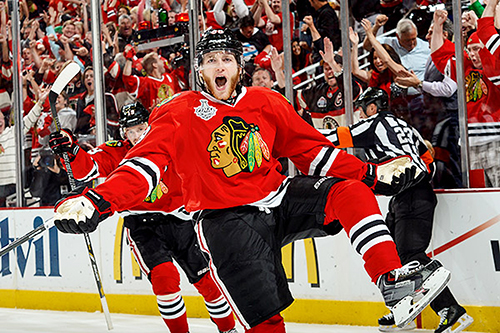The hockey season that almost didn’t happen came to an end last week as the Chicago Blackhawks closed out Game 6 on the road in Boston to claim their second Stanley Cup in four years. They capped off the victory with a parade through downtown Chicago on Friday, leading up to a rally at Grant Park’s Hutchinson Field.
Blackhawks bring fans back to the ice

The hockey season that almost didn’t happen came to an end last week as the Chicago Blackhawks closed out Game 6 on the road in Boston to claim their second Stanley Cup in four years. They capped off the victory with a parade through downtown Chicago on Friday, leading up to a rally at Grant Park’s Hutchinson Field.
As the assembly of double-decker buses loaded with players, coaches and staff made its way down Washington Street amid a throng of red-clad supporters, it was hard not to think back to mid-October and the thick gloom that hung over hockey fans while a lockout between players and owners prevented the NHL from opening on schedule for the fourth time since 1992. The season was delayed for three months while negotiations dragged on, with a 48-game schedule finally starting up again on January 19 to an expected wave of criticism and fan resentment.
What a difference six months makes. Fast-forward to June and the culmination of an abbreviated but thoroughly compelling campaign in the NHL—a showdown between the Blackhawks and 2011 champions the Boston Bruins that was close throughout and concluded in thrilling fashion. Chicago was up three games to two and trailing by one goal with a little more than a minute remaining in Game 6 when Blackhawks head coach Joel Quenneville withdrew goalkeeper Corey Crawford, trading an empty net for an extra skater.
The move was a necessary risk to try to stage one last attack on the Bruins’ defense, and it paid off as well as Chicago could have hoped. Left winger Brian Bickell scored the tying goal with 1:16 left in the game, and with the Bruins expecting overtime—as three of the first four games in the series had been decided—center Dave Bolland rebounded a deflected shot and deposited it into the net just 17 seconds later to put the Blackhawks ahead for good and claim the franchise’s fifth championship. The comeback victory was the icing on the cake for Chicago, whose 24-game unbeaten streak to start the season helped to lift the spirits of a continent full of hockey diehards.
Television ratings for the finals were among the highest in league history and, if this edition of the Stanley Cup is any indication, the future of hockey looks to be in fantastic shape. Despite the fallout from this season’s late start, the league is reaping the rewards of some changes to the rulebook in recent years (goodbye draws, hello penalty shootouts!) and excellent marketing efforts like the Winter Classic (outdoor hockey on New Year’s Day? yes, please). The Blackhawks’ rise to the pinnacle of the sport and their matchup with Boston in the finals was an especially fortunate turn of events, bringing two Original Six members back into the spotlight as spurned fans searched for reasons to return into the fold.
The rebirth of elite professional hockey in the Windy City has been a welcome, if somewhat unexpected, development over the last few years. A team that had featured legends like Bobby Hull, Stan Mikita and Denis Savard had long since fallen by the wayside—in 2004, after failing to make the playoffs in six of the previous seven years, ESPN named the Blackhawks the worst franchise in professional sports. A large portion of the collective ire was directed at team owner Bill Wirtz, a man nicknamed “Dollar Bill” for his penny-pinching tactics in the front office. Wirtz is widely remembered for his reluctance to allow local television broadcasting of his team, believing it to be unfair to season ticket holders—alienating hordes of fans in the process.
When the franchise decided to increase ticket prices in the early 2000s (at a time when the Hawks were routinely missing the playoffs), many hockey fans in the region were forced to look elsewhere to get their fix, with the majority settling on the minor-league Chicago Wolves. Wirtz passed away in 2007 and ownership was transferred to his son Rocky, who immediately set about reversing the downward trend of the once-proud organization. Rocky showed a willingness to spend money on talent, which led to the acquisition of several high-profile players like winger Marian Hossa and defender Duncan Keith. Additionally, the team’s draft day fortunes began to improve, with current captain Jonathan Toews coming on board in 2006 and Patrick Kane—the hard-partying, mullet-sporting fan favorite and most recent
finals MVP—arriving in 2007.
There is still plenty of work to be done to repair the damage done by the latest lockout. But the Blackhawks have undoubtedly set the process in motion, exhibiting just the right combination of character, flair for drama and cold-blooded effectiveness that gets fans to come back for more. After years of substandard performances by the franchise, this group now finds itself on the fast track to dynasty status. It’s not an easy task, to be sure. At least they’ll have a full slate of games on the schedule next season to try and figure it out.







